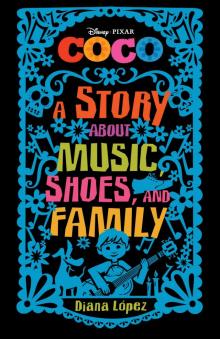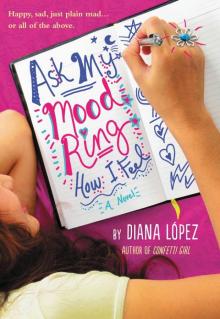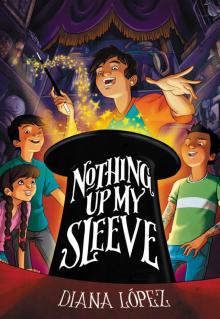- Home
- Diana Lopez
Choke Page 11
Choke Read online
Page 11
“I’m tired of looking at that boring scene,” she explained, nodding toward the courtyard. “That fountain used to work, and we used to have herbs, vegetables, and lots of flowers, even the kind that attracted butterflies and hummingbirds. We had an occupational therapist at the time. He used gardening for our therapy. But then he left, and since the next therapist didn’t like being outside, we all let the place go.”
“Why don’t you get together and fix it up again?”
“I guess it seems like too big a project. Where would we start?”
Mrs. Vargas looked out, her eyes full of daydreams.
“It was so pleasant,” she remembered. “We’d sit out there, drink our lemonade and enjoy the sun. And even when I didn’t go outside, I’d at least have something to look at. But now, even the trees look depressed. Why put all that effort into making leaves if no one’s going to enjoy the shade?”
I nodded. The trees did look scraggly.
Mrs. Vargas sighed. “All the crafts in the world aren’t going to bring the plants back,” she said.
My poor “granny.” First the courtyard dried out, and then her friend Mrs. Williams got moved to the third floor. Mrs. Vargas had a lot of worries, just like me.
“Let’s make something anyway,” I said. “It probably won’t help the plants, but at least we can bring in some color. Who knows? Maybe your neighbors will get excited and add their own projects.”
We scanned the book again, skipping the birdhouses and feeders because we didn’t have a saw, hammer, or nails. Luckily, we found projects we could make — wreaths and macramé holders for hanging baskets. We had one problem, though. We’d have to go shopping first because we didn’t have all the supplies.
“I’ll ask my mom to take us to Hobby Lobby when she gets off work,” I told Mrs. Vargas.
“I’m afraid I can’t go today. We’ll have to wait for my next check.”
Usually, Mrs. Vargas had extra money, but sometimes she spent it. Pleasant Hill has a van, and each week, one of the orderlies drives Mrs. Vargas and her friends to the movies or mall. Sometimes, they see an exhibit at a local museum or walk through the botanical gardens. Other times, they volunteer at elementary schools or help at the polls on election days. Mrs. Vargas likes to stay busy, so she goes on every outing.
“Where did the van go this week?” I asked.
“To El Mercado.”
El Mercado is a favorite tourist spot in downtown San Antonio. It has restaurants, tienditas, and a museum. Ballet folklórico dancers often perform in the plaza.
“Did you have fun?” I asked.
“I didn’t go.”
“Why not?”
“Because I had forty dollars,” she said. “But then it was gone.”
“You lost it?”
“Perhaps.” She glanced at her dresser as if deciding something. “Perhaps I lost it,” she repeated. “Or perhaps someone took it from me.”
“You mean it was stolen! Who would do such a thing?” I imagined thugs in ski masks barreling through her door and overturning the mattress, the chairs, and all the dresser drawers till they found her forty bucks — and poor Mrs. Vargas cowering in a corner. I wished I could punch those thieves in the face.
“I wasn’t going to mention it,” Mrs. Vargas said. “But since it came up, I better tell you about my suspicions.”
“Tell me,” I insisted. “We can talk to the charge nurse and the security guard. Maybe we can get your money back.”
“I don’t care about the money, Windy. But I do care about you.” She paused a moment, as if deciding again. “I last saw the money a week ago. You come all the time, and you often bring Elena. When you girls leave, everything is in its place. But last week you brought a new friend, and when she left, so did my money.”
I gasped. “You think Nina stole it?”
“Perhaps,” Mrs. Vargas said again. “I don’t have any proof. Maybe I did lose the money. I’m a viejita already. Sometimes I forget things.”
“You had to lose it, Mrs. Vargas. Nina wouldn’t steal from you. Why would she do that? She has her own money. And she’s really cool, double cool. She doesn’t have to be my friend, but she is. She thinks I’m interesting. I’m her breath sister — which is kind of like the girl version of blood brothers. So you can see how much she cares about me. And because of her, I have a lot of new friends now. Things are better for me lately, a lot better.” I couldn’t stop myself. I needed to defend Nina. But as I kept talking, I started to wonder. Who was I trying to convince? Mrs. Vargas or myself?
“Okay, okay,” Mrs. Vargas interrupted. “I’m just trying to put two and two together. But what do I know? I’m not a detective.”
“No, you’re not,” I said, immediately sorry that I sounded so rude.
I had probably hurt her feelings, but she didn’t let on. She dropped the subject after we agreed to shop the following week.
We watched TV for a while, and at noon, we went to lunch. I always eat in the public dining room when I visit Mrs. Vargas. Some of the residents have trouble getting in and out of their chairs, so I become a part-time waitress, bringing them condiments or refilling their tea. I don’t mind. I love being near them and hearing their stories. They’re the funniest and wisest people I know, and, best of all, they don’t have in-crowd or out-crowd sections in their dining room.
“Where were you last week?” they asked. “We thought we saw you in the morning.”
“I was here for a little while,” I explained. “But then I went shopping with my friend.”
Mentioning the shopping trip made me think about that day. Nina had bought lunch, paid for my makeup, and given me cash for the bus, yet at the book fair, she said her mom never gave her money. So why did she have some last Saturday? Did her mom make an exception, or did Nina take the money from Mrs. Vargas? Oh, no! We had closed our eyes while Elena played the piccolo, and when we opened them, Nina was at the dresser!
The blood must have drained from my face because one of the ladies patted my hand and asked if I was okay.
“Oh, yes,” I said. “Just tired, I guess.”
And I was tired. Tired of trying to figure people out. Elena never held grudges, but after three days, she was still mad at me. My dad kept changing himself, but instead of being patient, Mom scolded him. Ronnie was super nice now, but he still didn’t like me, not the way I liked him. The in-crowd girls were suddenly my friends, but only because I had played the choking game. But what if I hadn’t? What if I said I’d never play again? Would they stay my friends? And then Nina. I didn’t even know where to start with Nina. She was the most confusing of all.
I was still thinking about all this when I left Pleasant Hill.
“I can’t believe I agreed to work two Saturdays in a row,” Mom complained as we drove home. “My feet are killing me. I’ve only had one day off in two weeks. I’m so glad your dad’s at Abuelita’s. She always sends back food. At least I won’t have to cook dinner or do any cleaning. I just want to shower, soak my feet, and watch movies.”
She kept talking, but her voice was behind many walls. I kept wondering about Nina. Was she my friend, or not? I considered my TOP FIVE notebook, but this time, I didn’t want a record of my doubts. So I mentally made lists instead — all the nice things Nina did against all the times she seemed a little mean. Immediately, the thugs I’d pictured earlier turned into Nina. She didn’t have a mask. She didn’t make a mess. She wasn’t brutal. But, somehow, Nina’s way of breaking in seemed worse. She caught me off guard, like a day that started out sunny but then got cold.
“Home at last,” Mom said as she pulled the car into the driveway.
We got out of the car and made our way to the porch. Mom unlocked the front door, and when we stepped inside, we gasped. White Poly-fil stuck out of a ripped cushion. Coffee from an overturned cup dripped off the edge of a TV tray. A plant stand had toppled over — the ceramic pot broken, its dirt and ivy leaves littering the ground. Store ads, newspaper pages, and my homework w
ere all over the floor. A confused road of toilet paper crisscrossed the room. And the house stunk. There was definitely poop in here.
“What happened?” Mom cried.
Just then, Raindrop peeked from beneath the couch. He ran to me, rubbed the back of his ears against my leg, and purred like the happiest cat in the world. I’d forgotten to let him out this morning! I must have been too rushed and sleepy. No wonder there was a mess. Even though I didn’t witness it, I knew he’d spent the day dashing from room to room, corner to corner, like a rocketing pinball.
“Are you serious?” Mom said. “Another cat, Windy?”
“I can explain.”
“Oh, no. Don’t bother. I’ve heard it all before.”
“But, Mom …”
“Let me guess. He was lonely. He was starving. He needed a home.”
She was right. She had heard it all before.
“We had an arrangement,” she said. “No more cats. Remember?”
I nodded as I picked up Raindrop. He felt so warm and soft. I really loved him and couldn’t imagine life without him. A lump formed in my throat, a sign that I was about to cry. I tried to brace myself, but the tears came anyway.
Mom was not moved. “I’m sorry, mija, but you have to get rid of that cat. Rules are rules.”
“I can’t abandon him in the street,” I cried. “And if we take him to the shelter, they’ll gas him!”
Raindrop jumped out of my arms and scratched at the door.
“Since you decided to make him your responsibility, you’ll have to find him a home,” Mom said. “Staying here is out of the question. I have to be firm on this. We already have three cats. That’s enough. I mean it.”
“But I can take care of him, too!”
Mom opened the door, and Raindrop sprinted out. “Look at him,” she said. “He’s not an indoor kind of cat.”
I knew it made no sense, but part of me felt like Raindrop had betrayed me.
Mom headed toward her room. “You have till summer to find him a home. If he’s still here by the time school ends, I’m taking him to the shelter, understand?” She turned into the hallway, but before she disappeared behind the wall, she said, “Make sure you clean up that mess.”
I could do it. I could sweep the floor, wipe the tables, and try to mend the ripped cushion. I could get this room looking normal again. But what about the other messes in my life? How could I ever clean up those?
Wear your glasses!” Mom said as I left for school on Monday.
She’d promised to e-mail my teachers to make sure, so I reluctantly put them on. When I walked into the building, I was amazed by the details I’d overlooked before — smudges on the trophy case, faded letters on the bulletin boards, a missing F on the OFFICE sign above the counselor’s door. Our lockers were gray, but where the paint flaked off, I saw maroon. Some were dented; others, rusted. Mine had a purple squiggle. When did it get there? I saw the coach patrolling the hall. He wasn’t as muscular as I thought — just big and soft, like the grand prize of a carnival game.
“Hey, Windy!” Liz beckoned me, so I followed her to the courtyard where we found the other in-crowd girls at a picnic table. Everyone talked excitedly about the weekend, but I couldn’t pay attention. I was too busy noticing that some of the girls had pimples beneath their makeup. One even wore braces, and another had on glasses, just like me. So why did everyone think they were prettier than the rest of us?
“Look! There’s Nina,” one of the girls said.
As soon as I saw Nina, my stomach got tight and my foot started tapping the ground — just like each time I gave a speech in Mrs. Campos’s class. I inched away, hoping to escape before she reached us, but it was too late.
“Where are you going?” she asked.
“I, um — I, um — you see, I forgot something in my locker.”
“Okay. I’ll go with you.”
“No! I mean, thanks for offering, but I’ll only be a minute.”
She looked slightly confused.
“Hurry back, then, okay?” she said.
“Sure,” I answered.
But I had no intention of rushing back. I hurried down the hall, looking for a place to be alone, to figure things out. I needed to know if Nina stole Mrs. Vargas’s money. I couldn’t ask her directly, could I? Then again, I couldn’t pretend like everything was fine. This mystery had to be solved.
“Trouper, wait up!” Ronnie called.
I turned. As he approached me, I wondered if he had pimples or crooked teeth like I’d seen on the in-crowd girls, but even with my glasses on, Ronnie was supercute.
“Remember what we talked about Friday?” he said.
As if I’d forget!
“So have you talked to Nina?”
“I just got to school,” I said, unable to hide my impatience. “What do you want me to do? March up to Nina while she’s with her friends, and say, ‘Ronnie’s got the hots for you!’”
I was mad. I know I was mad, but Ronnie didn’t hear it. He had a built-in audio mixer, one that muted the sounds he disliked and boosted the ones he favored.
“Good thinking, Trouper. I’m glad you’re going to mention it deceitfully.”
“You mean ‘discreetly’?”
“Yeah. Isn’t that what I said?”
“No.”
“Sure, it is.”
“No, it isn’t,” I snapped. Then, I did an about-face and walked away.
But there was no way to hide, especially when Nina waited at my locker after each class.
“How was your weekend?” she asked after first period.
I shrugged.
“Did we have any homework for speech?” she asked after second period.
I shrugged again.
After third period, she said, “You’re acting weird today. Did something happen when I was absent?”
This time I did answer. “You could say that.”
“Really? Was it one of the girls? Did somebody say something?”
“No. They were very nice to me,” I said.
“Then what? Did Elena act like a brat again? Because it’s not your fault she’s mad about that silly list.”
“It’s not Elena.”
“Then why are you so moody?” She paused a moment and studied my face. “Is it me?”
“You could say that,” I repeated. I didn’t offer any details. I just took off again.
Nina followed me. She had to, since we were both in Mrs. Campos’s class. I went straight to my seat. Elena had already left a piccolo case and lunch box on her desk, but since she wasn’t around, Nina pushed them aside and sat down. While I settled into my chair, she absentmindedly bunched one end of her scarf. Today it was a dingy white — like a T-shirt that had been dirtied and washed a dozen times. It had a few snags, too, and a stain near the edge as if it’d been dipped in coffee or tea.
“Talk to me,” she said.
I turned away as I reached into my backpack for supplies. Then Ronnie stepped in. He didn’t approach us, but he went, “Psst,” and threw me a thumbs-up.
“What is that all about?” Nina asked.
“He likes you,” I said. “Not as a friend, but as a girlfriend.”
“Are you serious?”
“Double serious.”
She looked at him. He looked at her. Their gazes locked. Only he looked like a gushing puppy, while Nina looked like a bothered cat.
“Alphabetical order!” Mrs. Campos called as the tardy bell rang.
Nina went to her seat in front of Ronnie. Normally, she sat sideways, but today, she gave him her back. He glanced my way and gestured, “What happened?”
Before I could answer, Elena bumped into me because, in addition to the piccolo case and lunch box on her desk, she had her own backpack as well as the presentation board and diorama from last week’s book fair.
“Excuse me,” she said as she tried to organize her stuff.
“That’s okay,” I answered. Then, “Did you have a good weekend?”
“It was okay.”
I was hoping she’d answer with one of her word-morphs, but at least she said something. Mrs. Campos started to lecture, but I couldn’t concentrate. In fact, I hadn’t been able to concentrate all morning. If I wasn’t careful, my C’s would slip to D’s. I thought about the panoramic pictures in my living room, the lightning, the strong winds. I had lightning and wind inside of me, too, but I wasn’t the sky. I couldn’t tear through my surroundings whenever I felt like it. So I sat quietly at my desk even though my emotions were a storm.
Finally, the dismissal bell rang. Lunchtime. Normally, this was my favorite part of the day, but right now, I wasn’t in the mood for Nina and the in-crowd.
“Are you going to the cafeteria?” I asked Elena.
“No, I’m eating in the band hall today.” She strapped on her backpack, tucked her poster beneath her arm, clutched her diorama, piccolo case, and lunch box, and then discovered that she still needed to get her purse.
“Here.” I looped the strap around her neck.
“Thanks,” she said. She took a few steps toward the exit, but then she turned around. “I’ll probably eat in the cafeteria tomorrow, okay?”
I smiled. “That would be coolicious.” Maybe the chain latch to Elena’s heart was still locked, but at least she’d opened the door as wide as the chain would allow. Maybe tomorrow she’d open it all the way.
I glanced toward Ronnie and Nina’s aisle. Ronnie was trying to start a conversation. Nina ignored him, so he gave up and left. I grabbed my things and tried to sneak out, but Nina caught me and grabbed my elbow.
“Come on,” she said, leading me toward the restroom. “We need to talk.”
Part of me still wanted to hide, but the other part knew I had to talk to her.
Luckily, the restroom was empty. Toilet stalls lined one side of the room, their doors barely connected to the hinges. The walls were covered with patches of gray paint struggling to hide graffiti. One of the windows had a square of plywood instead of glass. A couple of sinks were stopped up with hair or bubble gum, and paper towels littered the floor. This restroom was a pit compared to the one Nina and I went to at Dillard’s.
“I can’t believe Ronnie likes me,” she began. “No wonder you’re so mad.”

 Coco Middle Grade Novel
Coco Middle Grade Novel Ask My Mood Ring How I Feel
Ask My Mood Ring How I Feel Choke
Choke Confetti Girl
Confetti Girl Lucky Luna
Lucky Luna Nothing Up My Sleeve
Nothing Up My Sleeve